#young writers in Nigeria
Explore tagged Tumblr posts
Text

DELTA-V by Daniel Suarez
RELEASE DATE: April 23, 2019
In the year 2032, heroic cave diver James "J.T." Tighe is recruited by shifty bitcoin billionaire Nathan Joyce for a daring undertaking in outer space.
As a private entrepreneur, Joyce is out to introduce asteroid mining in cis-lunar space (the area above Earth's gravity well), which, by establishing commerce there, will, he promises, pave the way for space travel. The rub is that Joyce will do anything to keep the project afloat, including breaking laws and keeping crucial details secret. Tighe and his fellow crew members, ranging from a young male electronics expert from Nigeria to a legendary female mountain climber from Argentina, are tested and trained on Ascension Island in the South Atlantic, where they are bound to a strict confidentiality clause and denied any personal privacy. By the time these handsomely paid adventurers make it "farther from Earth than any human beings in history," we learn about their varied backgrounds, particularly the lingering effects of Tighe's troubled past. Fatal accidents occur before a shocking death imperils the crew's return home. Suarez's (Change Agent, 2017, etc.) ability to keep things humming through low-key stretches as well as dramatic sequences reflects his skills as a writer. He makes a curious choice in quickly dropping the sexual tension arising from group showers, among other nude encounters. But Suarez is otherwise in admirable control. A cut above most tech novels, Suarez's latest benefits from his attention to detail, which boosts the believability of his futuristic vision.
5 notes
·
View notes
Text
Have You Heard Of?

“A man who would be intimidated by me is exactly the kind of man I would have no interest in.”
Chimamanda Ngozi Adichie b.September 15, 1977
Chimamanda Ngozi Adichie is an award-winning author and an influential advocate of feminism. She has captivated people worldwide with her powerful storytelling and her outspoken campaign for gender equality. She was born in Enugu, Nigeria, and was raised in an academic environment that surely nurtured her passion for writing. As one of six siblings she grew up in the university town of Nsukka, her Mother was the first female registrar at University of Masuka and her father was Nigeria's first professor of statistics, and later became Deputy Vice-Chancellor of the same university. She attributes her success in part to her parents for, encouraging her self-confidence and being supportive by always showing that they had confidence in her. She began studying medicine and pharmacy at the university school her parents worked at; though, writing seems to have called to her, as she also edited the magazine created by the medical students. She left her medical studies after a year and a half when at nineteen she gained a scholarship to Eastern Connecticut State University in America, where she graduated summa cum laude (with highest honours) with a degree in communication and political science and continued her passion for writing by producing articles for the university journal. She went on to gain her master’s degree in creative writing from Johns Hopkins University, become a Hodder Fellow at Princeton University, earned an MA in African Studies from Yale University, and she was awarded a fellowship by the Radcliffe Institute for Advanced Study, Harvard University. During this time, she has released numerous novels, including A Feminist Manifesto in Fifteen Suggestions. She holds strong feelings regarding gender equality and is proud of her femininity, taking pleasure in fashion whilst grappling with the knowledge that she will be judged for the way she chooses to dress. Her belief is that you should be happy to be who you are, without being forced into a mould society has decided fits your gender. Refusing to conform to a female academic stereotype, she loves make-up and has been the face of Boots No7 cosmetics. Now married with a daughter, she splits her time between Nigeria, where she teaches writing workshops, and the United States. All in all, Chimamanda Ngozi Adichie is a world-renowned writer, acclaimed academic, fashion icon, beauty queen and a feminist warrior we all should have heard of.

“If you criticise X in women but do not criticise X in men, then you do not have a problem with X, you have a problem with women.”
Books and Novels






Notable Awards and Honors
35 awards, 21 are literary awards, including: Future… Award (Young Person of the Year category), 2008 Global Hope Coalition's Thought Leadership Award, 2018 Action Against Hunger Humanitarian Award, 2018 UN Foundation Global Leadership Award, 2019 Africa Freedom Prize 2020 Business Insider Africa Awards, 'Creative Leader of the Year', 12 April 2022 Influential people lists including: The New Yorker's '20 Under 40', 2010 '100 Most Influential Africans 2013', New African '100 Most Influential People' by Time Magazine, 2015 Fortune Magazine's List of 50 World Leaders, 2017 'World's Most Inspiring People in 2019' by OOOM Magazine Forbes Africa's '100 Icons from Africa', 2021 'Changemakers: 100 Nigerians Leading Transformational Change', 2022

“Teach her to reject likeability. Her job is not to make herself likeable, her job is to be her full self, a self that is honest and aware of the equal humanity of other people.”
Trivia
Her childhood home was one formerly occupied by the Nigerian writer Chinua Achebe
Beyoncé's song, "Flawless," features excerpts from Adichie's TED Talk.
Adichie thought she had invented purple hibiscus & was shocked to receive a call from her editor telling her they existed in America!
#Have You Heard Of#Chimamanda Ngozi Adichie#Purple Hibiscus#Half of a Yellow Sun#Americanah#We Should All Be Feminists#Feminism#Nigerian Author#Literary Influence#Gender Equality#Beyoncé Flawless#Feminist Literature#Book Recommendations#Author Spotlight#Literature#Women Writers#Diverse Voices
7 notes
·
View notes
Text

Luvvie Ajayi (Ifeoluwa Ajayi, January 5, 1985) known as Luvvie Ajayi Jones, is a Nigerian–American author, speaker, and digital strategist. Her book, I’m Judging You: The Do-Better Manual, was a New York Times best-seller.
She was born in Nigeria; she moved to Chicago with her family when she was nine. She attended Whitney M. Young Magnet High School and the University of Illinois at Urbana-Champaign, studying Psychology.
She began her career in marketing and digital strategy and started blogging in 2003. Her site AwesomelyLuvvie.com amassed a following, particularly for her recaps of television shows like Scandal, drawing the attention of Scandal showrunner Shonda Rhimes. In 2016, The New York Times reported that she had an audience of approximately 500,000 between her personal Twitter feed and the Awesomely Luvvie website.
She published her first book, I’m Judging You: The Do-Better Manual, it debuted at #5 on the New York Times best-seller list. Consequently, a «return to ethics—a return to a higher level of behavior for oneself and others—becomes the central idea of her book, in The Root’s description, but the collection of witty essays is less about pointing fingers and more about building a positive, healthy self and society. Shonda Rhimes and Betsy Beers have acquired I’m Judging You to adapt as a cable comedy series through their company Shondaland and ABC Signature.
In 2016, she was the first writer invited to speak at the National Museum of African American History and Culture, and her event sold out. In 2018, she launched two podcasts: “Rants and Randomness with Luvvie Ajayi” and “Jesus and Jollof,” cohosted by Yvonne Orji. In 2021, she published Professional Troublemaker: A Fear-Fighter Manual, another New York Times best seller.
She was selected to be the opening speaker for the 2022 Public Library Association conference and was the closing speaker for the 2022 American Library Association conference.
She is a member of Delta Sigma Theta Sorority and the International Academy of Digital Arts and Sciences. #africanhistory365 #africanexcellence #deltasigmatheta
2 notes
·
View notes
Text
Holidays 11.6
Holidays
All the Good Things Wrapped Up in One Day
Arbor Day (Republic of Congo, Samoa)
Bank Workers’ Day (Argentina)
Constitution Day (Dominican Republic, Tajikistan)
Electric Razor Day
Fala Day
Fill Our Staplers Day
Finnish Swedish Heritage Day
Flag Day (Chad, Finland)
Global Refill Day
Green March Day (Morocco, Western Sahara)
Gustavus Adolphus Day (Sweden)
Hydrogen Bomb First Test Day
International Day For Preventing the Exploitation of the Environment in War & Armed Conflict (UN)
International End Gossip Day
International Tracksuit Day
Legalization Day (Cannabis)
Malaria Day in the Americas
Marching Band Day
Marijuana Recreational Legalization Day (Colorado, Washington)
Marooned Without a Compass Day
Measure Up Day
National Basketball Day (a.k.a. Play Basketball Day)
National I Read Canadian Day (Canada)
National Ladies Learning Code Day (Canada)
National Michele Day
National Report Home Health Care Fraud Day
National Stacey Abrams Day
National Team Manager Day
Obama Day (Kenya)
Pine Nut Day (French Republic)
Recreational Cannabis Legalization Day (Colorado)
Saxophone Day
Scotchtoberfest (The Simpsons)
Skirret Day (French Republic)
Stranger Things Day
Tazaungdaing (Myanmar)
United Americas Day
World Cee-C Day (Nigeria)
World Lets Stop Shouting Awareness Day
World Materials Day
World Paper Free Day
Food & Drink Celebrations
Do Tater Tots Ever Grow Up? Day
Global Donut Day
National Nachos Day (a.k.a. I Love Nachos Day)
Peanut Butter Lovers Day
Independence & Related Days
Constitution Day (Tajikistan)
Cycoldia (Declared; 2018) [unrecognized]
Day of the First Shout For Independence (El Salvador)
Mexico (Independence Declared; 1813)
Polish Republic (Declared; 1918)
1st Wednesday in November
Eat Smart Day [1st Wednesday]
Hump Day [Every Wednesday]
International Pathology Day [1st Wednesday]
International Stress Awareness Day [1st Wednesday]
Men’s World Day [1st Wednesday]
National Advent Calendar Day [1st Wednesday]
National Eating Healthy Day [1st Wednesday]
National Holiday Calendar Day [1st Wednesday]
National Stress Awareness Day (UK) [1st Wednesday]
Take Our Kids to Work Day (Canada) [1st Wednesday]
Wacky Wednesday [Every Wednesday]
Website Wednesday [Every Wednesday]
Wheat Beer Wednesday [1st Wednesday of Each Month]
Wilderness Wednesday [1st Wednesday of Each Month]
Wobbly Wednesday [1st Wednesday]
Weekly Holidays beginning November 6 (1st Full Week of November)
None Known
Festivals Beginning November 6, 2024
Dublin Book Festival (Dublin, Ireland) [thru 11.10]
Hawai'i Food & Wine Festival (Oahu, Hawaii) [thru 11.10]
Jazz Fest Sarajevo (Sarajevo, Bosnia and Herzegovina) [thru 11.9]
Stockholm International Film Festival (Stockholm, Sweden) [thru 11.17]
Worlds of Flavor International Conference and Festival (Napa Valley, California) [thru 11.8]
Feast Days
Adelaide of Italy (Christian; Saint)
Albert Camus (Writerism)
Alois Senefelder (Artology)
Barlaam of Khutyn (Christian; Saint)
Birth of the Bab (Baha'i) [1 Muharram]
Birth of Tiamat (Ancient Egyptian mother of gods, goddess of primeval chaos)
Burroughs Day (Church of the SubGenius; Saint)
Cosimo de Medici the Elder (Positivist; Saint)
Dabucuri uiga, (Initiation Rites of the Young Men; to Jurupari, South American Guarani/Tupi God)
Demetrian (Christian; Saint)
Dodo Grieving Day (Pastafarian)
Feast of All Saints of Ireland (Ireland)
Festival of Total Submission
Herne’s Day II: Predator (Pagan)
Illtud (a.k.a. Illtyd or Iltntus; Christian; Saint)
Illitud’s Bell (Celtic Book of Days)
Learn a New Swear Word Day (Pastafarian)
Leonard of Noblac (Christian; Saint) [Coopers] *
Los Posadas (Latin America) [until 12.24]
Lucy Jones (Muppetism)
Melaine of Rennes (Christian; Saint)
Misa de Gallo begins (Rooster’s Mass; Philippines) [until 12.24]
Stephanie Vozzo (Artology)
Tiamat the Dragon Mother Day (Everyday Wicca)
Winds of Change Day (Starza Pagan Book of Days)
Winnoc (Christian; Saint)
Wish-Granting Championships (Fairies; Shamanism)
Lucky & Unlucky Days
Sakimake (先負 Japan) [Bad luck in the morning, good luck in the afternoon.]
Tycho Brahe Unlucky Day (Scandinavia) [33 of 37]
Uncyclopedia Bad to Be Born Today (because it’s National Day to Lose Money on Horses.)
Unglückstage (Unlucky Day; Pennsylvania Dutch) [26 of 30]
Unlucky Day (Grafton’s Manual of 1565) [51 of 60]
Premieres
All Along the Watchtower, recorded by Bob Dylan (Song; 1967)
And Then There Were None, by Agatha Christie (Mystery Novel; 1939) [29]
Behind Blue Eyes, by The Who (Song; 1971)
The Boondocks (Animated TV Series; 2005)
Chew Chew Baby or Stick to Your Gums (Rocky & Bullwinkle Cartoon, S4, Ep. 175; 1962)
A Cowboy Needs a Horse (Disney Cartoon; 1956)
Cry Freedom (Film; 1987)
Elizabeth (Film; 1998)
The Flea Circus (Tex Avery MGM Cartoon; 1954)
Forget-Me-Net, Parts 3 & 4 (Underdog Cartoon, S2, Eps. 31 & 32; 1965)
Foxtrot, by Genesis (Album; 1972)
Go Down Mooses or The Fall Guy (Rocky & Bullwinkle Cartoon, S2, Ep. 70; 1960)
Harry Potter and the Goblet of Fire (Film; 2005) [#4]
Head (Film; 1968)
Hiding Out (Film; 1987)
Hold What You’ve Got, by Joe Tex (Song; 1964)
Ickle Meets Pickle (Terrytoons Cartoon; 1942)
Jersey Boys (Broadway Musical; 2005)
John Wesley Harding, recorded by Bob Dylan (Song; 1967)
Justify My Love, by Madonna (Album; 1990)
Kitty Caddy (Phantasies Cartoon; 1947)
Less Than Zero (Film; 1987)
Little Good Beep (WB LT Cartoon; 2000)
The Little Match Girl (Color Rhapsody Cartoon; 1937)
Little Red Walking Hood (WB MM Cartoon; 1937)
Made in Heaven, by Queen (Album; 1995)
Meet the Press (TV Series; 1947)
The Missing Mountain or Peek-a-Boo Peak (Rocky & Bullwinkle Cartoon, S2, Ep. 69; 1960)
The Moon Fell in the River, by Guy Lombardo (Song; 1940)
Paper Doll, by The Mills Brothers (Song; 1943)
Passenger 57 (Film; 1992)
Pisces, Aquarius, Capricorn & Jones Ltd., by The Monks (Album; 1967)
Precious (Film; 2009)
Rain of Terror or The Desperate Showers (Rocky & Bullwinkle Cartoon, S4, Ep. 176; 1962)
The Robot Spy (Animated TV Show;Jonny Quest #8; 1964)
Secrets of Life (Short Documentary Film; 1956)
Ski-Napper (Chilly Willy Cartoon; 1964)
Sky Trooper (Disney Cartoon; 1942)
Spectre (UK Film; 2015) [James Bond #24]
Spotlight (Film; 2015)
Symphony No. 3 in A Minor, by Sergei Rachmaninoff (Symphony; 1936)
Time Bandits (Film; 1981)
24 (TV Series; 2001)
The Universe in a Nutshell, by Stephen Hawking (Book; 2001)
The Unpopular Mechanic (Oswald the Lucky Rabbit Cartoon; 1936)
An Unsuitable Job for a Woman, by P.D. James (Novel; 1972)
When We Were Very Young, by A.A.Milne (Children’s Book; 1924)
Wintertime Dreams, recorded by Woody Herman (Song; 1936)
Woody’s Kook-Out (Woody Woodpecker Cartoon; 1961)
Your Friend the Rat (Pixar Cartoon; 2007)
The Zoo (Oswald the Lucky Rabbit Cartoon; 1933)
Today’s Name Days
Christina, Leonhard, Rudolf (Austria)
Leonard, Melanija, Sever, Vedran (Croatia)
Liběna (Czech Republic)
Leonhardus (Denmark)
Aadi, Aado, Aadu, Ado, Adolf (Estonia)
Mimosa (Finland)
Bertille, Léonard (France)
Christine, Leonhard, Nina (Germany)
Leonardo (Greece)
Lénárd (Hungary)
Leonardo (Italy)
Leo, Leonards, Leonhards, Leons, Linards (Latvia)
Ašmantas, Leonardas, Vygaudė (Lithuania)
Lennart, Leonard (Norway)
Feliks, Leonard, Trzebowit, Ziemowit (Poland)
Pavel (Romania)
Renáta (Slovakia)
Alejandro, Leonardo, Severo (Spain)
Adolf, Gustav (Sweden)
Mac, Mack, Mackenzie, Makenzie, Mckenzie (USA)
Today is Also…
Day of Year: Day 311 of 2024; 55 days remaining in the year
ISO: Day 3 of Week 45 of 2024
Celtic Tree Calendar: Hagal (Hailstone) [Day 11 of 28]
Chinese: Month 10 (Yi-Hai), Day 6 (Jia-Xu)
Chinese Year of the: Dragon 4722 (until January 29, 2025) [Wu-Chen]
Hebrew: 5 Heshvan 5785
Islamic: 4 Jumada I 1446
J Cal: 11 Wood; Foursday [11 of 30]
Julian: 24 October 2024
Moon: 24%: Waxing Crescent
Positivist: 3 Frederic (12th Month) [Guicciardini / Philippe de Comines]
Runic Half Month: Wyn (Joy) [Day 15 of 15]
Season: Autumn or Fall (Day 45 of 90)
Week: 1st Full Week of November
Zodiac: Scorpio (Day 14 of 30)
2 notes
·
View notes
Text
INSPECTOR WAZIRI LEADS THE INVESTIGATION

A Nigerian film about a difficult period to see if you have not already. It is October 1. The movie came out in 2014. However, the cinematographic work remains relevant today.
The story takes place a few days before Nigeria's Independence Day in 1960. This is where the title of the film comes from. Inspector Danladi Waziri (Sadiq Daba) investigates a series of rapes and murders of women west of the country, a small town called Akote, in Igbo region.
The director of this psychological movie, Kunle Afolayan, leads the historical and sociological plot masterfully. Danladi Waziri is an austere man, originally from the North. His appearance is very different from his compatriots in the West. Rather slender with a darker complexion, he has the withdrawn look of the men of the desert, of a Sahelian. He belongs to the Hausa people.
He is leading an investigation into a serial killer. It is the early 60s and almost no one knows what DNA means, including the inspector. He will investigate with the means at hand. Analysis of the crime scene, manipulation of the victims' bodies, the marks on the strangled women. They are virgin teenagers surprised in the darkness of a forest. Gradually, inspector Waziri will understand that he is after a criminal who knows the terrain and therefore a native of the country. However, local police categorically refuse to accept this hypothesis. They are convinced that no man from Akote can commit such atrocities. It is definitely someone from elsewhere. The man from the North is alone against everyone.
The local chief has a soothsayer who is worried about the murders in the area. The traditional priest tells his visitors that the killings will continue until the murderer is satisfied. Nevertheless, the inspector is unable to question the local soothsayer about his premonitory remarks. The police fear that the witch doctor will cast a bad spell on them if they dare to take him to the police station. Consequently, Waziri swims in a total enigma.
Yet this matter must be resolved before the handover of power from Britain to Nigeria. Inspector Waziri superior, a British man, plans to pack up and close the case once Nigeria is independent.
October 1 is much more than an African thriller. There is palpable ethnic tension, particularly when Waziri arrests a suspect like himself from the North. The local population wants to take justice into their own hands. The angry crowd gathers in front of the poor man's prison. Waziri knows he is innocent given the clues he has. However, the locals do not trust the investigator. They want to punish the suspect themselves because they are sure he is guilty.
We must add the difficult relations that the police officer maintains with the British colonizers. Their condescension and arrogance force the inspector to suffer frequent humiliations. His superior, a young man, insists on calling him “Dany Boy,” even though Waziri is his father’s age. However, Africa of the 60s is committed to respecting elders. It is inconceivable to treat a middle-aged African with no respect.
The reconstruction of the feverish atmosphere before independence is a success. In this film, there is a need to show young Africans what life was like during colonization.
All the actors played their respective roles with conviction. We come away won over by the quality of the dramatic acting. A film to see and appreciate.
Didier Leclair, writer Pic: (All Rights reserved)
3 notes
·
View notes
Text
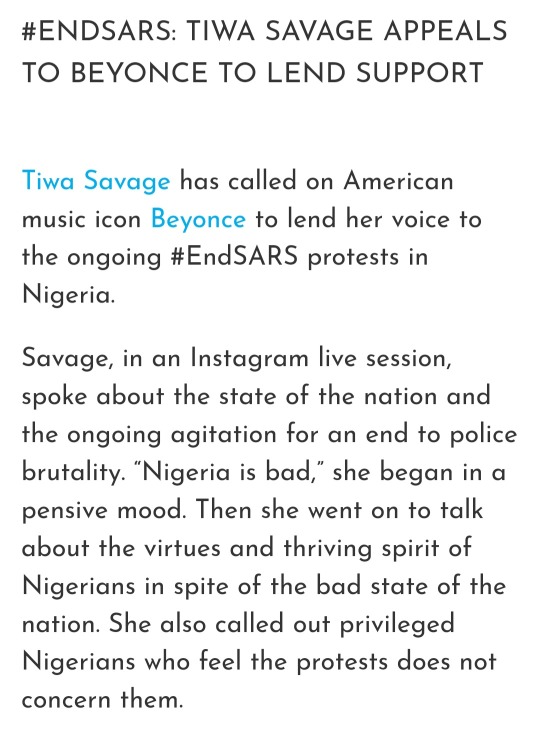
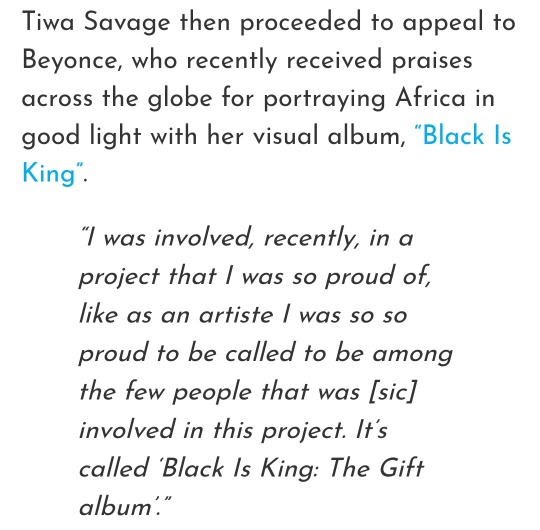
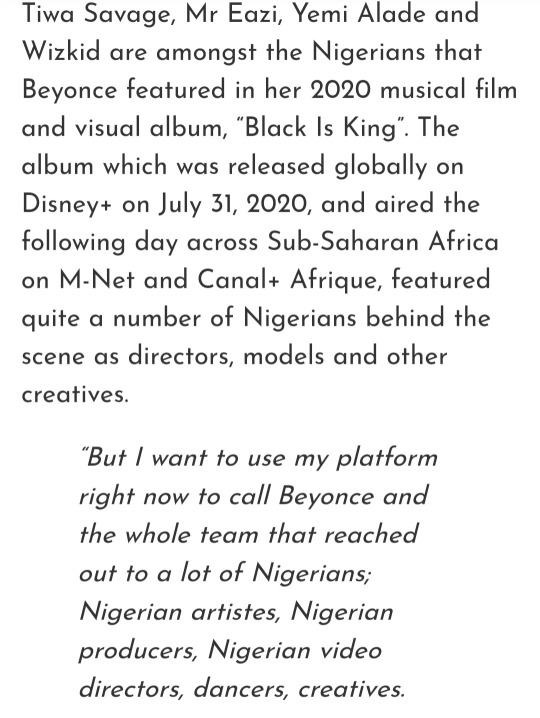
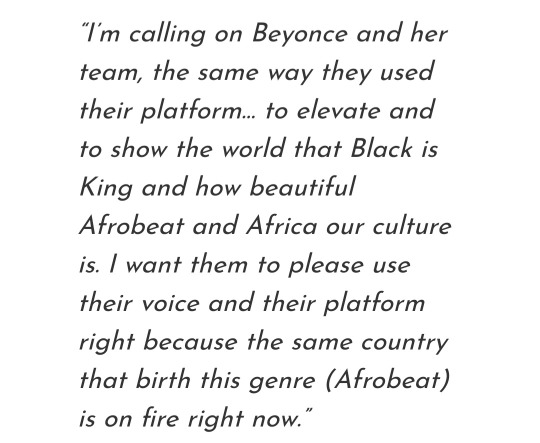

On October 21, 2020 Beyonce's publicist, Yvette Noel-Schure responded to Beyoncé being called out by Tiwa. She wrote that, "Not all activists live on social media. Not all doers look for validation nor your approval. Not all work is for a Photo Op. Make it normal to stop judging people's actions based on posts. Posts don't make you an activist. Actions make you an activist. Whether in the background or out in the streets. We all choose a different path to get it done. Blessed are those who do not see yet they believe. Actions speak louder than posts! Stop Judging. S.T.O.P."
Beyoncé's mom gets into War of Words on Social Media with Tiwa Savage
On the same day, Beyoncé's mother, Tina Knowles also replied in a lengthy Instagram post as she wrote, "Good Morning, I am deeply saddened by the events that happened last night in Lagos! When people lost their lives and were beaten and abused. I understand the injustices that have been going on in Nigeria, it sickens me.
SARS came to my attention last week and immediately I posted about it! I had not heard of it before as I have not been following closely Instagram as much as I usually do due to some serious personal family challenges. As a result I have been mostly posting funny things to try to make people smile.
After researching on line I understood that SARS (a special task force supposedly to stop crime) were abusing their power and harassing young people. Very much like what we have been protesting for, here in America. Everyday we are disproportionately stopped harassed jailed and sometimes killed! These senseless killings of our black men and women! The brutal treatment of our people by law enforcement! No knock warrants, etc. Of course I guess much of the public does not think we have personal problems in our family. We are supposed to be superhuman and not have loss, or health issues or personal problems because our sole purpose is suppose to be of service and humility and take as much abuse from the haters as they choose to put on us. No matter what my daughter does she is scrutinized and torn apart!
She makes a record and uses all African artists, producers, writers. She is criticized because she didn't get artist from every country in Africa there are 52 countries! Then she makes a film that by the way she doesn't profit a penny off of, because she spent every penny in the budget on making something that celebrates our heritage!
What profiting off of you did she do? She made art!! She is an artist! That is what artist do. She is not your political leader and not your whipping board. They saw a 30 second trailer and critics and couch activist attacked!!!!! Yes I said it and I meant it!
They came out and did their usual thing about her being a culture vulture and saying some of the most ugly and vile things about her that were totally not true and insults galore.
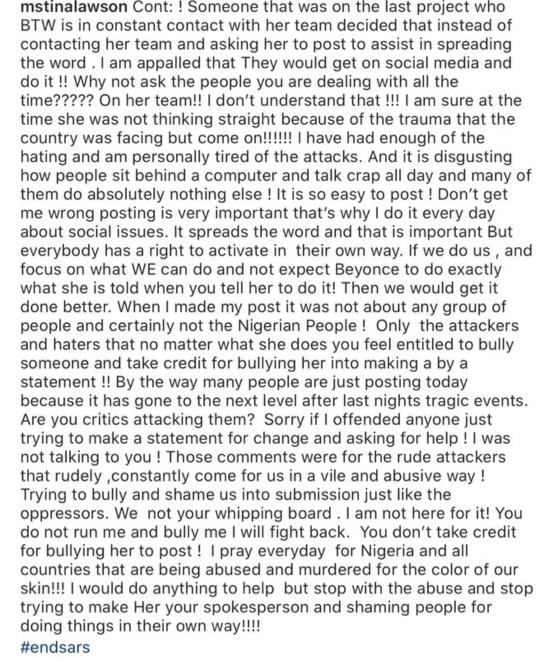
Social media users reacted to Tina's online outburst:
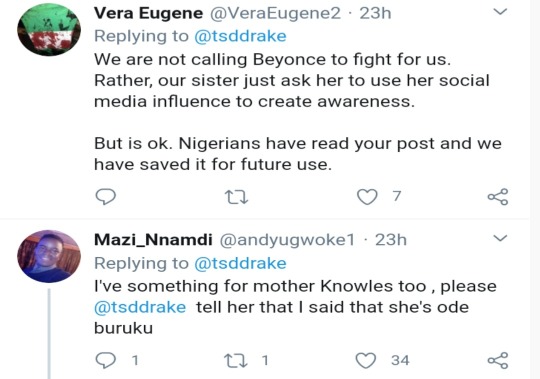
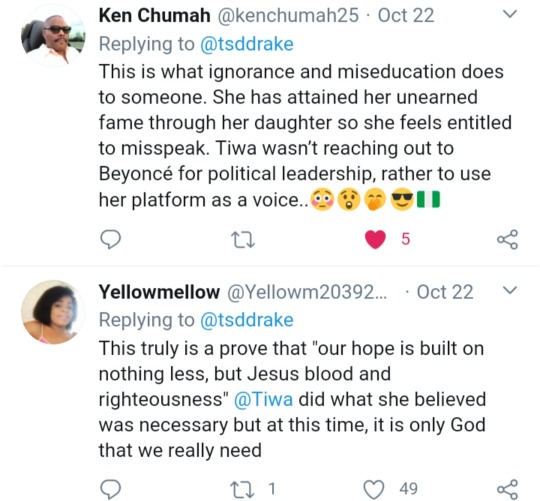
0 notes
Text
Featured Post: The Ordained Demon: The Story of a Young Priest by Oladapo Osuntokun

About The Ordained Demon: The Story of a Young Priest: "The Ordained Demon" is an exciting book that combines self-help, Christian fiction, and thriller genres. It tells the story of a young priest named Michael who faces temptations and battles the demon possessing a man. With the power of God, Michael heals the possessed man and eliminates the demon. However, the demon returns and threatens to harm Michael. The book explores the consequences of ambition, abandonment, and failure to adhere to sacred vows. It highlights the importance of being attached to Jesus Christ and avoiding the traps of Satan. The story is cleverly woven and presented in a straightforward and easy-to-understand format. It will take readers on a thrilling journey and keep them engaged from beginning to end. Targeted Age Group: all Written by: Oladapo Osuntokun Buy the ebook: Buy the Book On Amazon Buy the Print Book: Buy the Book On Amazon Buy the Book On Barnes & Noble/Nook Author Bio: Dr. Oladapo. R. Osuntokun was born in Nigeria and emigrated to the USA many years ago. By the time he got on the plane, he was training to become an orthopedic surgeon. As the plane was air bound, he had an Epiphany. It was the voice of God gently instructing him about his impending mission. The voice was reassuring but gently instructing him that he would no longer heal people with a "knife but the words. He uses the words in various ways, including his current mission as an Author, a Psychiatrist, and a Pastor. Dr. Oladapo Richard Osuntokun is the Word of God Parish pastor in Luzerne, PA. A Pentecostal Spiritual filled Bible-based Church.He is a guest/ visiting Professor at Clark's Summit University, where he has taught African and World Religion since 2017 till date. Dr. Oladapo Richard Osuntokun is a board-certified pediatric and Adolescent Psychiatrist. He is also a board-certified General and Adult Psychiatrist. He attended the Albert Einstein College of Medicine at Montefiore, Bronx, NY, from 2000 to 2005 for his education. Dr. Osuntokun is also an Associate Professor of Psychiatric Medicine at the Geissinger College of Medicine in Scranton, Pa. He has won the Top Doctor award for the past several years. The Marquis "who is who in America" has included Dr. Oladapo Richard Osuntokun as a biographical listee. Follow the author on social media: Learn more about the writer. Visit the Author's Website Facebook Fan Page Twitter Instagram Read the full article
2 notes
·
View notes
Photo
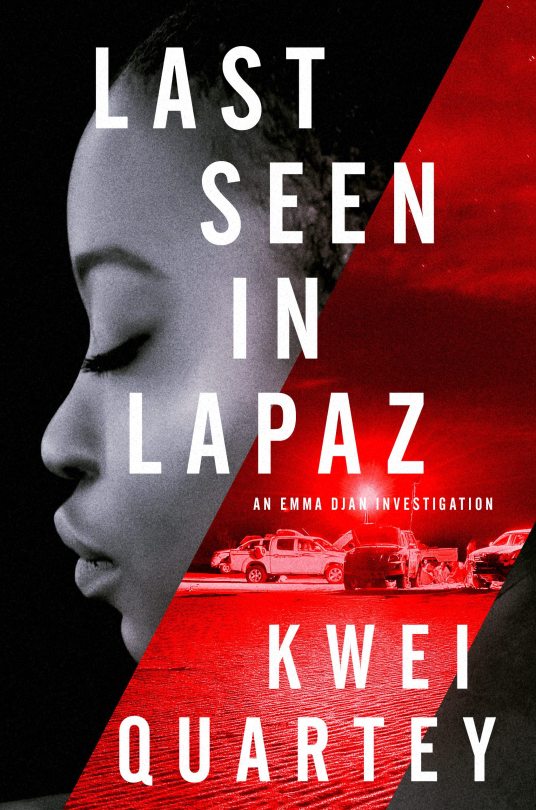
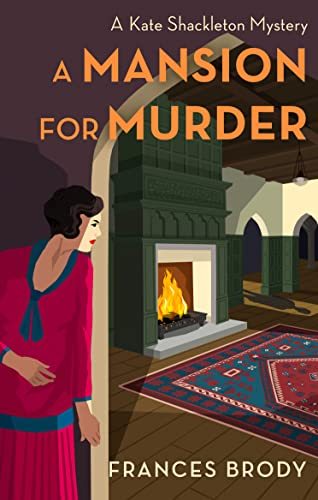
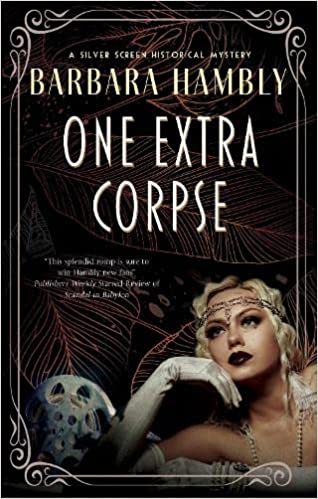
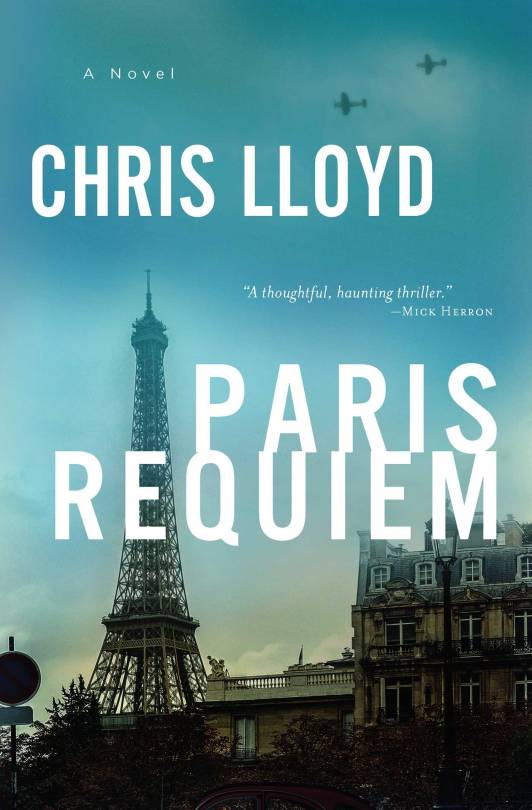
New Title Tuesday: Mystery
Last Seen in Lapaz by Kwei Quartey
When a whirlwind romance leads to the disappearance of a young Nigerian woman and a dead body, PI Emma Djan resorts to dangerous undercover work to track her down in Accra.
Just as things at work are slowing down for PI Emma Djan, an old friend of her boss’s asks for help tracking down his missing daughter. According to her father, Ngozi was just months shy of graduating high school when she became secretive and withdrawn. Suddenly, all she wanted to do was be with her handsome new beau, Femi, instead of attending law school in the fall. So when she disappears from her parents’ house in Nigeria the middle of a summer night, they immediately suspect Femi was behind it and have reason to believe the pair has fled to Accra.
During Emma’s first week on the case, Femi is found murdered at his opulent residence in Accra, and Ngozi still has not been found. Fearing the worst, Emma digs further and discovers Femi was part of a network of sex traffickers in several West African countries. Migrants from Ghana and Nigeria are duped into thinking they are on their way to success and riches in Italy. But once there—if they even survive the grueling trip across the desert—they are manipulated into sex work with little chance of escape.
As successful as Femi was, he took advantage of nearly everyone he met, leaving a trail of enemies in his wake, all of whom had motives to kill him. The question is, which one of them did it? Not only does Emma have to hunt the killer down; she’s in a race against time to find Ngozi before she ends up in a pool of blood like Femi.
This is the third volume in the “Emma Djan Investigation” series.
A Mansion for Murder by Frances Brody
1930, Yorkshire. Intrigued by a mysterious letter from a stranger offering important information, Private Investigator Kate Shackleton arrives in the mill village of Saltaire. At nearby Milner Field mansion, overshadowed by its reputation for misfortune and untimely deaths, she expects to meet the letter writer, Ronnie Creswell.
Kate soon hears the shocking news that Ronnie has been killed. At first his death appears to be a tragic accident at the mill, but soon it becomes clear that Ronnie's demise was no mishap. Kate is enlisted to help investigate the murder.
Kate moves into the tower rooms at Milner Field, as she tries to uncover resentments, industrial espionage, and old secrets in the close-knit village. Although she doesn't believe in curses, she wonders what sinister truth lies behind this latest in the litany of deaths connected to the infamous Milner Field.
Then just when things couldn't get any worse, a young girl in the village goes missing, and Kate must use all her strength and skill to unravel the mystery around the mansion once and for all...
This is the 13th volume in the “Kate Shackleton” series.
One Extra Corpse by Barbara Hambly
May, 1924. It's been seven months since young British widow Emma Blackstone arrived in Hollywood to serve as companion to Kitty Flint: her beautiful, silent-movie star sister-in-law. Kitty is generous, kind-hearted . . . and a truly terrible actress. Not that Emma minds; she's too busy making her academic parents turn in their graves with her new job writing painfully historically inaccurate scenarios for Foremost Studios, in between wrangling their leading lady out of the arms of her army of amorous suitors.
So when one of Kitty's old flames, renowned film director Ernst Zapolya, calls Emma and tells her it's imperative he meet with Kitty that morning, she's not surprised. Until, that is, he adds that lives depend on it. Ernest sounds frightened. But what can have scared him so badly - and what on earth does cheerful, flighty Kitty have to do with it?
Only Ernest can provide the answers, and Kitty and Emma travel to the set of his extravagant new movie to find them. But the shocking discovery they make there only raises further questions . . . including: will they stay alive long enough to solve the murderous puzzle?
This is the second volume in the “Silver Screen Historical Mystery” series.
Paris Requiem by Chris Lloyd
Paris, 1940. As the city adjusts to life under Nazi occupation, Detective Eddie Giral struggles to reconcile his job as a policeman with his new role enforcing a regime he cannot believe in, but must work under.
He's sacrificed so much in order to survive in this new world, but the past is not so easily forgotten. When an old friend—and an old flame—reappear, begging for his help, Eddie must decide how far he will go to help those he loves.
The notion of justice itself quickly becomes as dangerous, blurred, and confused as the war itself. And Eddie’s morale compass, ever on unreliable foundations, will be questioned again and again as the ravages of the German occupation steadily attempt to grind him—and the city he loves—into submission.
Negotiating a path between resistance and collaboration, he can remain a good man and do nothing—or risk everything he has achieved in a desperate act of resistance.
#mystery#mysteries#series#New Books#new library books#Book Recommendations#book recs#Reading Recs#reading recommendations#tbr#TBR pile#tbrpile#to read#Want To Read#Booklr#book tumblr#book blog#library blog
2 notes
·
View notes
Text
MERSEA presents: Hit
Afrobeats from Africa. Beautiful music

Mercy Onyekachi Ogbolu staged name MERSEA is a young talented Female Nigerian Afro Pop Artiste, a brand Ambassador, a song writer and a performing Artiste Signed to SPINNING CONCEPTS an international record Label.
instagram
She's out with a brand new Single titled AMIN song was produced in Ghana by Liugeebeatz and Mixed and mastered in Nigeria by Perfperfsoundz. Mersea is a fast-rising Artiste you definitely recorn with.
Listen HIT in Spotify:
#JOPAH album is out now
0 notes
Text
Holidays 11.6
Holidays
All the Good Things Wrapped Up in One Day
Arbor Day (Republic of Congo, Samoa)
Bank Workers’ Day (Argentina)
Constitution Day (Dominican Republic, Tajikistan)
Electric Razor Day
Fala Day
Fill Our Staplers Day
Finnish Swedish Heritage Day
Flag Day (Chad, Finland)
Global Refill Day
Green March Day (Morocco, Western Sahara)
Gustavus Adolphus Day (Sweden)
Hydrogen Bomb First Test Day
International Day For Preventing the Exploitation of the Environment in War & Armed Conflict (UN)
International End Gossip Day
International Tracksuit Day
Legalization Day (Cannabis)
Malaria Day in the Americas
Marching Band Day
Marijuana Recreational Legalization Day (Colorado, Washington)
Marooned Without a Compass Day
Measure Up Day
National Basketball Day (a.k.a. Play Basketball Day)
National I Read Canadian Day (Canada)
National Ladies Learning Code Day (Canada)
National Michele Day
National Report Home Health Care Fraud Day
National Stacey Abrams Day
National Team Manager Day
Obama Day (Kenya)
Pine Nut Day (French Republic)
Recreational Cannabis Legalization Day (Colorado)
Saxophone Day
Scotchtoberfest (The Simpsons)
Skirret Day (French Republic)
Stranger Things Day
Tazaungdaing (Myanmar)
United Americas Day
World Cee-C Day (Nigeria)
World Lets Stop Shouting Awareness Day
World Materials Day
World Paper Free Day
Food & Drink Celebrations
Do Tater Tots Ever Grow Up? Day
Global Donut Day
National Nachos Day (a.k.a. I Love Nachos Day)
Peanut Butter Lovers Day
Independence & Related Days
Constitution Day (Tajikistan)
Cycoldia (Declared; 2018) [unrecognized]
Day of the First Shout For Independence (El Salvador)
Mexico (Independence Declared; 1813)
Polish Republic (Declared; 1918)
1st Wednesday in November
Eat Smart Day [1st Wednesday]
Hump Day [Every Wednesday]
International Pathology Day [1st Wednesday]
International Stress Awareness Day [1st Wednesday]
Men’s World Day [1st Wednesday]
National Advent Calendar Day [1st Wednesday]
National Eating Healthy Day [1st Wednesday]
National Holiday Calendar Day [1st Wednesday]
National Stress Awareness Day (UK) [1st Wednesday]
Take Our Kids to Work Day (Canada) [1st Wednesday]
Wacky Wednesday [Every Wednesday]
Website Wednesday [Every Wednesday]
Wheat Beer Wednesday [1st Wednesday of Each Month]
Wilderness Wednesday [1st Wednesday of Each Month]
Wobbly Wednesday [1st Wednesday]
Weekly Holidays beginning November 6 (1st Full Week of November)
None Known
Festivals Beginning November 6, 2024
Dublin Book Festival (Dublin, Ireland) [thru 11.10]
Hawai'i Food & Wine Festival (Oahu, Hawaii) [thru 11.10]
Jazz Fest Sarajevo (Sarajevo, Bosnia and Herzegovina) [thru 11.9]
Stockholm International Film Festival (Stockholm, Sweden) [thru 11.17]
Worlds of Flavor International Conference and Festival (Napa Valley, California) [thru 11.8]
Feast Days
Adelaide of Italy (Christian; Saint)
Albert Camus (Writerism)
Alois Senefelder (Artology)
Barlaam of Khutyn (Christian; Saint)
Birth of the Bab (Baha'i) [1 Muharram]
Birth of Tiamat (Ancient Egyptian mother of gods, goddess of primeval chaos)
Burroughs Day (Church of the SubGenius; Saint)
Cosimo de Medici the Elder (Positivist; Saint)
Dabucuri uiga, (Initiation Rites of the Young Men; to Jurupari, South American Guarani/Tupi God)
Demetrian (Christian; Saint)
Dodo Grieving Day (Pastafarian)
Feast of All Saints of Ireland (Ireland)
Festival of Total Submission
Herne’s Day II: Predator (Pagan)
Illtud (a.k.a. Illtyd or Iltntus; Christian; Saint)
Illitud’s Bell (Celtic Book of Days)
Learn a New Swear Word Day (Pastafarian)
Leonard of Noblac (Christian; Saint) [Coopers] *
Los Posadas (Latin America) [until 12.24]
Lucy Jones (Muppetism)
Melaine of Rennes (Christian; Saint)
Misa de Gallo begins (Rooster’s Mass; Philippines) [until 12.24]
Stephanie Vozzo (Artology)
Tiamat the Dragon Mother Day (Everyday Wicca)
Winds of Change Day (Starza Pagan Book of Days)
Winnoc (Christian; Saint)
Wish-Granting Championships (Fairies; Shamanism)
Lucky & Unlucky Days
Sakimake (先負 Japan) [Bad luck in the morning, good luck in the afternoon.]
Tycho Brahe Unlucky Day (Scandinavia) [33 of 37]
Uncyclopedia Bad to Be Born Today (because it’s National Day to Lose Money on Horses.)
Unglückstage (Unlucky Day; Pennsylvania Dutch) [26 of 30]
Unlucky Day (Grafton’s Manual of 1565) [51 of 60]
Premieres
All Along the Watchtower, recorded by Bob Dylan (Song; 1967)
And Then There Were None, by Agatha Christie (Mystery Novel; 1939) [29]
Behind Blue Eyes, by The Who (Song; 1971)
The Boondocks (Animated TV Series; 2005)
Chew Chew Baby or Stick to Your Gums (Rocky & Bullwinkle Cartoon, S4, Ep. 175; 1962)
A Cowboy Needs a Horse (Disney Cartoon; 1956)
Cry Freedom (Film; 1987)
Elizabeth (Film; 1998)
The Flea Circus (Tex Avery MGM Cartoon; 1954)
Forget-Me-Net, Parts 3 & 4 (Underdog Cartoon, S2, Eps. 31 & 32; 1965)
Foxtrot, by Genesis (Album; 1972)
Go Down Mooses or The Fall Guy (Rocky & Bullwinkle Cartoon, S2, Ep. 70; 1960)
Harry Potter and the Goblet of Fire (Film; 2005) [#4]
Head (Film; 1968)
Hiding Out (Film; 1987)
Hold What You’ve Got, by Joe Tex (Song; 1964)
Ickle Meets Pickle (Terrytoons Cartoon; 1942)
Jersey Boys (Broadway Musical; 2005)
John Wesley Harding, recorded by Bob Dylan (Song; 1967)
Justify My Love, by Madonna (Album; 1990)
Kitty Caddy (Phantasies Cartoon; 1947)
Less Than Zero (Film; 1987)
Little Good Beep (WB LT Cartoon; 2000)
The Little Match Girl (Color Rhapsody Cartoon; 1937)
Little Red Walking Hood (WB MM Cartoon; 1937)
Made in Heaven, by Queen (Album; 1995)
Meet the Press (TV Series; 1947)
The Missing Mountain or Peek-a-Boo Peak (Rocky & Bullwinkle Cartoon, S2, Ep. 69; 1960)
The Moon Fell in the River, by Guy Lombardo (Song; 1940)
Paper Doll, by The Mills Brothers (Song; 1943)
Passenger 57 (Film; 1992)
Pisces, Aquarius, Capricorn & Jones Ltd., by The Monks (Album; 1967)
Precious (Film; 2009)
Rain of Terror or The Desperate Showers (Rocky & Bullwinkle Cartoon, S4, Ep. 176; 1962)
The Robot Spy (Animated TV Show;Jonny Quest #8; 1964)
Secrets of Life (Short Documentary Film; 1956)
Ski-Napper (Chilly Willy Cartoon; 1964)
Sky Trooper (Disney Cartoon; 1942)
Spectre (UK Film; 2015) [James Bond #24]
Spotlight (Film; 2015)
Symphony No. 3 in A Minor, by Sergei Rachmaninoff (Symphony; 1936)
Time Bandits (Film; 1981)
24 (TV Series; 2001)
The Universe in a Nutshell, by Stephen Hawking (Book; 2001)
The Unpopular Mechanic (Oswald the Lucky Rabbit Cartoon; 1936)
An Unsuitable Job for a Woman, by P.D. James (Novel; 1972)
When We Were Very Young, by A.A.Milne (Children’s Book; 1924)
Wintertime Dreams, recorded by Woody Herman (Song; 1936)
Woody’s Kook-Out (Woody Woodpecker Cartoon; 1961)
Your Friend the Rat (Pixar Cartoon; 2007)
The Zoo (Oswald the Lucky Rabbit Cartoon; 1933)
Today’s Name Days
Christina, Leonhard, Rudolf (Austria)
Leonard, Melanija, Sever, Vedran (Croatia)
Liběna (Czech Republic)
Leonhardus (Denmark)
Aadi, Aado, Aadu, Ado, Adolf (Estonia)
Mimosa (Finland)
Bertille, Léonard (France)
Christine, Leonhard, Nina (Germany)
Leonardo (Greece)
Lénárd (Hungary)
Leonardo (Italy)
Leo, Leonards, Leonhards, Leons, Linards (Latvia)
Ašmantas, Leonardas, Vygaudė (Lithuania)
Lennart, Leonard (Norway)
Feliks, Leonard, Trzebowit, Ziemowit (Poland)
Pavel (Romania)
Renáta (Slovakia)
Alejandro, Leonardo, Severo (Spain)
Adolf, Gustav (Sweden)
Mac, Mack, Mackenzie, Makenzie, Mckenzie (USA)
Today is Also…
Day of Year: Day 311 of 2024; 55 days remaining in the year
ISO: Day 3 of Week 45 of 2024
Celtic Tree Calendar: Hagal (Hailstone) [Day 11 of 28]
Chinese: Month 10 (Yi-Hai), Day 6 (Jia-Xu)
Chinese Year of the: Dragon 4722 (until January 29, 2025) [Wu-Chen]
Hebrew: 5 Heshvan 5785
Islamic: 4 Jumada I 1446
J Cal: 11 Wood; Foursday [11 of 30]
Julian: 24 October 2024
Moon: 24%: Waxing Crescent
Positivist: 3 Frederic (12th Month) [Guicciardini / Philippe de Comines]
Runic Half Month: Wyn (Joy) [Day 15 of 15]
Season: Autumn or Fall (Day 45 of 90)
Week: 1st Full Week of November
Zodiac: Scorpio (Day 14 of 30)
0 notes
Text

Nigerian ‘Lovecraft Country’ Writer Tweets Offensive Slur Against African-Americans … HBO Does Nothing. Nigeria photo

In the African-American community, we have been witnessing a disturbing pattern of Nigerian-origin hateful rhetoric towards American descendants of slavery while burrowing themselves into the very same ecosystem that African-Americans have fought to create to give people of Nigerian-origin the pipeline to pursue opportunities in America.
What is more disturbing is these Nigerian-origin individuals engaged in hatred towards African-Americans appeared to be “sanctioned” by liberals/progressive platforms who are attempting to use black people from the Caribbean and Africa to appear as the “black narrative” in America.
Ihuoma Ofordire, who works on the HBO “Lovecraft Country” series, has revealed in a tweet she was warned by her mother about dating African-American men with the use of a Nigerian-origin slur called “Akata” that has a derogative meaning towards African-American people.
First of all, my reaction to this is probably the same as yours— this is weird and awkward, why would a bunch of Black people in Nigeria come up and devise an ethnic slur called “Akata” towards another group of black people in this world? Then their black Nigerian mothers are telling their Black daughters, not to date First-World African-American men like we some pieces of garbage out here? All of this makes no sense and unwarranted hatred considering how African-Americans actively contributed to the advancement of Black people worldwide in an unselfish and sacrificial manner. One of our Civil Rights heroes, Whitney Young died in Nigeria going over there to support them.
Furthermore, Ihuoma talks about being a proud “Igbo” — we African-Americans were the ones who accommodated the “Igbo” people from Nigeria in the 1970s when the state was massacring Igbos and taking over the Igbo kingdom — they got grisly macabre YouTube videos in case someone wants to forget their history. We African-Americans took Ihuoma people in here in America and the thanks we get is Ihuoma mother telling her about “Akata” and not to date them — that’s the thanks we get from Ihuoma moms and her.
The average African-American person like myself do not even know what is the context of “Akata” because this is something we don’t even expect to even realize a Black-on-Black slur word existed — we always thought of Black people around the world as our common family in the struggle against global white supremacy and oppression.
So why is this Ihuoma Ofordie tweeting out an ethnic slur against her own Black people in this world saying her mother is telling her not to date them? WTF is this BS?
Let me make something clear with anybody from Nigeria using slurs like “Akata” to African-Americans, this kind of hatred and slurs against African-Americans is beneath us and don’t even register on our radar. I can care less about some Nigerian old woman telling her Nigerian daughter not to date an African-American man — that sounds stupid and silly to African-American people that earned our position through blood, sweat, and tears to be the standard-bearer of blackness in this modern world.
I’m not even going to go there with how bad the actions of Nigerian nationals make everybody Black looks in this world — I can write a whole book on that with annotations if I want to go there. When I travel in remote parts of this world, you know what I get asked by people out of caution?
They ask me if I’m Nigerian. I say no, I’m American and they start smiling and talking about Muhammad Ali and James Brown — you Nigerians don’t have nor earned that kind of social capital to go around making up “Akata” slurs towards African-Americans. I’m not going to bring up the Nigerian and South African thing but we African-Americans are very well aware of that whole spat as well.
Furthermore, no one in America is going to protect anybody from the African Diaspora thinking they can come here to America and start disrespecting African-Americans. I don’t care what company, what liberal billionaire or what social media platform or blog platform is out there — African-Americans ain’t scared and we stand up to our oppressors and we don’t play with anybody around here. We fought and sacrificed too much to reach the station we are at today to play with crumb snatchers and bootlickers trying to undermine the legacy of African-American people and calling us names like Akata.
I will be in formal contact with AT&T as well as HBO over this Ihuoma Ofordie and her “Akata” hate tweet as well as other African-Americans who will not tolerate this mess. The sad and perplexing part is African-Americans have to figure out why the hell Nigerians even made up the word “Akata” as if we African-Americans has done something to the people of Nigeria to deserve this kind of hateful sentiment?
The first thing our Black mayors have done in America in the 1970s and 1980s was to create opportunities for Africans to migrate to places like Dallas, DC and more — the hell our African-American people done to Nigeria to be called something like “Akata” or Nigerian mothers telling their daughters don’t date African-American men? I’m very confused about that.
This “Akata” slur doesn’t even make sense to us but African-Americans will not be tolerating any more undermining hate towards us from anyone in the African Diaspora and we will come for any progressive/liberal groups and organizations sponsoring these Africans/Carribeans to feel empowered to come at African-Americans like this.
Listen to GHOGH with Jamarlin Martin | Episode 73: Jamarlin Martin Jamarlin makes the case for why this is a multi-factor rebellion vs. just protests about George Floyd. He discusses the Democratic Party’s sneaky relationship with the police in cities and states under Dem control, and why Joe Biden is a cop and the Steve Jobs of mass incarceration.
#Nigerian ‘Lovecraft Country’ Writer Tweets Offensive Slur Against African-Americans … HBO Does Nothing. Nigeria photo#yoruba slur#akata#saying akata#africans calling Black Americans slurs#africans using akata#calling someone a cotton picker#racism from africa
0 notes
Text
Chigozie Obioma is the Nigerian author of the novels The Fishermen (2015) and An Orchestra of Minorities (2019), both shortlisted for the Booker Prize for their unique, folkloric tales of Nigerian life in decades past. Like them, his 2024 novel The Road to the Country is “tinged with fable and prophecy”. It’s set in the brutal Nigerian Civil War of 1967-1960, fought between Nigeria and the Republic of Biafra, a secessionist state which had declared its independence. This epic story of “a young man seeking redemption in a country on fire” is about a shy Lagos student whose brother disappears during the war. He sets out to find him and make right something that happened in the past. We asked Obioma about the work.
Why did you undertake this story; how did it reveal itself?
I knew I wanted to write this book from very early on. In 1993, during a visit to my parents’ eastern village for the first time, I saw a lot of people with physical deformities of all sorts. I was surprised by this, having grown up in a city where I hardly saw anything of that sort. I asked my mother why these people were like this and she said to me, simply: “The war”. The village is in the former Biafran territory.
That stuck with me, and I never forgot it, so that, years later, I began to research the war very avidly and as I read and read, I realised I was going to be writing about it.
Then a couple of years ago, I had the idea of a Yoruba man from the west of Nigeria being conscripted to fight for Biafra, whose army was primarily made up of Igbos and minority groups. That gave me the window into the story and, almost immediately, I found the narrative pulse of the novel, which is centred on the journey into war of a man called Kunle looking to atone for a mistake he made as a child and ending up finding love and regeneration.
Was it a painful experience to recreate the war scenes?
I think so – this is historical fiction and I was looking to recreate a time in history that has not received as much attention as it should. And these events actually happened to people. I know it’s a cliché to say that people who have experienced the horrors of war, especially combatants, do not like to speak about it, but Biafra is especially unique in that this was a war of unequal forces to the nth degree.
As I depict in the novel, much of the time the Biafrans were fighting without weapons. We are talking of a company of 70 soldiers with only 40 rifles and very limited ammunition going against a federal unit equipped with tanks and heavy weapons and aerial support.
Why is family and brotherhood such a central concern of yours?
I am interested in relationships, which for me is the energy for storytelling. How do people form connections, break those connections, and sometimes attempt to put those connections back together again? This is what I am interested in investigating in stories, and it so happens that familial relationships have been part of that (The Fishermen).
I have also explored varied relationships including romantic relationships between a man and a woman and a mystical relationship between a man and his spirit (An Orchestra of Minorities). In The Road to the Country, I investigate the relationship between Kunle and his comrades, and a romantic relationship between him and his love interest, Agnes. So, while brotherhood features in many of these novels, it has not been the only focus.
What role does Igbo identity play in the work?
I believe that a writer is a sum of herself. There is the sense of who you are, have become and are becoming. These are the things that shape your writing to a degree. That is to say that these things are malleable, and must constantly change or, at least, shift.
Identity is too stiff, too anchored to be useful for the serious writer – I think. So, it doesn’t play a role. That said, it is obvious that I am interested in Igbo worldview, cultures, traditions and history.
Part of the reason for this interest is that I see a lot of unmined treasures for storytelling there, rather than for any sentimental reason. But I am also curious about the Yoruba cultures, American, Turkish, Danish, Swedish, Indian, Jamaican and all the places I have lived in or am interested in.
That said, outside the page, I am of course Igbo, Nigerian, African, Black…
Why the war? Why is a younger Nigerian writer interested in it?
I don’t know who wouldn’t be interested in something of that scale. The Biafran War of Independence was a catastrophe of epic proportions in the history of Nigeria. It reshaped the country and helped birth Nigeria as we know it today.
I wanted to write this novel because I was surprised to find that there was an abundance of non-fiction written about the war. There is some war-time fiction: that is, fiction in which the war is the backdrop. What you don’t find are many war novels: fiction in which the war is the central focus. I wanted to write a novel very much focused on the war, like All Quiet on the Western Front, a novel by Erich Maria Remarque, which depicts the fighting in the first world war.
What do you want readers to take away?
I framed the novel as a general warning on the consequences of not engaging in dialogue. What starts wars? Isn’t it often years of neglect, inability to arrive at a meaningful dialogue and shared understanding? That is why large scale violence is still occurring today.
So, the war portion of the novel itself has been presented to us in its entirety as a vision of the future so that it appears as if this war, though a historical fact, has not yet happened and can somehow be prevented if only we heed the warnings of the seer. The prime question for any society in this world then is this: who is or are your seers? Are we listening to them?
1 note
·
View note
Text
An Author Sparks Creativity Among Young Creators.

From immersing herself in the world of literature to crafting her own stories, Chidera Okolie has been nurturing her creative interests since she was a child. The Nigerian lawyer and writer is the author of two novels, When Silence Becomes Too Loud (2014) and Not Forgiven (2017). Beyond her passion for writing, Okolie is actively encouraging young writers in Nigeria to fulfil their writing dreams through her Idios Creatives initiative, which she launched in 2018. This is her story. Chidera Okolie set up Idios Creatives, a platform for young people to explore and express their creativity. “Through the Idios Creatives project, I wanted to provide a platform for a new generation of writers to embrace their creative power. It is my way of contributing to the development of young peopleʼs writing and other creative skills,” Okolie explains. To capture the attention of young people across Nigeria, in 2018, Okolie created the Idios Prize for Flash Fiction and Poetry. Over 300 schoolchildren took part in the competition. “We visited schools across Nigeria, collecting short stories from young writers. Eventually, we had about 300 stories, which we narrowed down to the best 100 for publication. This has helped showcase the abundance of creative talent in Nigeria,” Okolie notes. In setting up Idios Creatives, her strongest hope is that “young people are encouraged to read more and to explore their own creativity.”
Advancing IP and creativity in Nigeria
The author is also a champion of intellectual property rights, highlighting their crucial importance in recognizing, rewarding and supporting creators for their work. “IP allows you to protect your creative work from exploitation, illegal reproduction and misuse. It also ensures the preservation of your economic rights, in other words, your ability to earn income from your work, and your moral rights, including the right to be credited as the creator, and the right to protect the integrity of your work,” Okolie explains. While Nigeria has made progress in this regard, Okolie believes there is still more to be done to enhance the countryʼs copyright landscape. “Nigeria has long suffered from piracy, but the landscape is graduallyimproving. I strongly believe that IP rights play a critical role in emboldening artists to safeguard their work and use it for economic benefits. This becomes particularly significant when building a career based on oneʼs creativity,” she says. Okolie started writing her first novel, When Silence Becomes Too Loud, in 2014, without any intention of sharing it outside her personal sphere. “It was purely a personal endeavor,” she notes. But her father insisted that she have her book published. “I was hesitant to reveal myself so intimately and to allow others to delve into my innermost creative thoughts," she says. Despite her initial fears, Okolie started looking for a publisher and the bookʼs release, in 2014, exceeded all her expectations. “The book was widely acclaimed in my country and gained a lot of attention. It caught the eye of my countryʼs former president, who expressed his pride in associating with young people who strive to keep creativity alive in the country,” Okolie explains.

Her outstanding novel earned her three awards, including the 2016 Nigerian Writers Award for Best Fiction Writer of the Year and a nomination for the African Achieverʼs award. Building on her success, Okolieʼs second publication, Not Forgiven, is a collection of short psychological thrillers and also won accolades, paving the way for her to receive Most Outstanding Fiction Writer of the Year in 2017. In January 2019, Okolie was listed among the 100 Most Influential Young Nigerians by Avance Media.
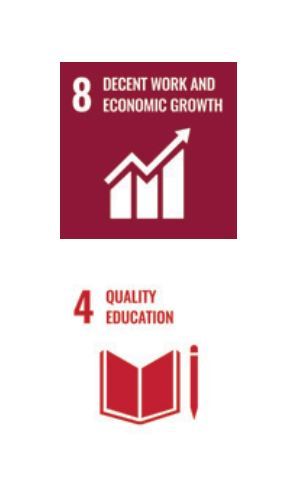
#Young Creators#26 april#world i.p. day#ip and the sdgs#imagination & creativity#literature sector#creative interests#nigeria#sdg4#sdg8#copyright#authors#ip at work
0 notes
Text
#thisweekthosebooks contextualises the rise of #young leaders in #Ireland and #Senegal:
A young activist’s ‘manifesto of the youth revolution’.
A masterpiece by one of Nigeria’s greatest writers on how youthful political idealism can falter and corrode.
Please read and share.
0 notes
Text

Tell us about yourself.: Sabinah Adewole is a bestselling author. She has enjoyed reading from an early age. She studied English and her poetry has been formed from her own experiences as chronicled in her “Journeys of Life” which has inspired many readers across the globe. This book is her fifth Children’s book focusing on -Identity, Values, Unique, Race and Self belief The poems in this series (Vol 2) were created in the United Kingdom on the authors’ journey to a shopping mall with her daughter during the easing of lockdown restrictions during the Covid Pandemic. It was an opportunity for children to enjoy a day out with their families during the summer break. This experience brought back childhood memories for both the author and her daughter, and which is shown through the eyes of the children in the shopping mall. Where did you grow up, and how did this influence your writing?: i grew up in Nigeria , i was born in the United kingdom and left at the age of four with mum after i lost my dad in a car accident- you can read -My Memoirs Empowerment Defiance where i share my life stoy of Strength and Motherhood overcoming Rejection. Do you have any unusual writing habits? i write on the train or in the middle of the night if a thought comes to mind. i also use my notes on my mobile phone a lot. What authors have influenced you? i grew up in Nigeria , i was born in the United kingdom and left at the age of four with mum after i lost my dad in a car accident- you can read -My Memoirs Empowerment Defiance where i share my life stoy of Strength and Motherhood overcoming Rejection. Do you have any advice for new authors? Keep writing and make sure you don't give up on your dreams. What is the best advice you have ever been given? My publisher advised me to self publish my books and by my own ISBN's. What are you reading now? i read a book in the library daily and leave it there i follow what interests me What's your biggest weakness? My biggest weakness is writing poems and storing them on my phone What is your favorite book of all time? Merchant of Venice Things Fall Apart When you're not writing, how do you like to spend your time? Vacating Going to the Gym Attending Yoga sessions sight seeing Visiting Art Gallaries Do you remember the first story you ever read, and the impact it had on you? Animal Farm i enjoyed reading this books as a Child and also Oliver Twist was another book i enjoyed. I loved Literature. What has inspired you and your writing style? Identity, Values, Uniqueness The Inspiration behind the book - Belief in your self We are all individuals and our unique qualities are demonstrated in this inspiring book! The Author was inspired to write about Children enjoying a day in the shopping mall with their family or foster parent showcasing each unique quality in each child in the mall. She highlights each unique relationship a child has with their parent; exposes grey spots like disability, a father having to change a daughter, a father caring for a baby in the food court, a single parent with four young children, a black mum with a white son, a black dad with a mixed-race son A foster parent and her children, the boy with dread locks and his mum, the Arabic girl with her parents, the Somalian What are you working on now? A Day on a Journey to Lakeside Shopping Mall Vol 2 What is your favorite method for promoting your work? Book Blogs Author Interviews Book Promotions What's next for you as a writer? To do my first Audio Book How well do you work under pressure? I remain Calm due to the nature of my primary role as a Social Care Manager. How do you decide what tone to use with a particular piece of writing? My tone has always been relaxed and consistent because i write Poetry. If you could share one thing with your fans, what would that be? Be Yourself. Believe in Yourself. Sabinah Adewole's Author Websites and Profiles Website Goodreads Profile Sabinah Adewole's Social Media Links Facebook Page Twitter Instagram YouTube Account Read the full article
0 notes
Text
Holidays 4.10
Holidays
ASPCA Day
Black Hole Day
Commodore Perry Day
Day of the Builder (Azerbaijan)
Dust the Ceiling Fan Day
Encourage a Young Writer Day
Every Day Is Earth Day
410 Day
Frances Perkins Day
Global Work From Home Day
Godfather of Soul Day (South Carolina)
Golfer's Day
Humane Day
Hung Kings Festival (Vietnam)
Internal Troops Day (Tajikistan)
International Day of Sterilization Sciences
International Safety Pin Day
International Spy Day
Juan Santamaria Day (Costa Rica)
Judas Tree Day (French Republic
Lachesis Asteroid Day
Larry the Lobster Day (SNL)
National Biomechanics Day
National Bookmobile Day
National Calvin Day
National Erase Your Self-Negativity Day
National Farm Animals Day
National Femboy Day
National Hug Your Dog Day
National Library Outreach Day
National Love Our Children Day
National Nana Day
National Report IRS Tax Fraud Day
National Rubber Day (Thailand)
National Siblings Day
National Sprint Car Day
National Tamara Day
National Transplant Financial Coordinator Day
National Youth HIV and AIDS Awareness Day
Ram Navami (India, Nepal)
Safety Pin Day
Salvation Army Founder's Day
Semana Santa (Nicaragua)
Siblings Day
Son-in-Law Day
World Baton Twirling Day
World Day of West Syndrome
World Homeopathy Day
World Jaguar Day
World Sindhi Language Day
Food & Drink Celebrations
Cinnamon Crescent Roll Day
Tipopils Day (Italy)
2nd Wednesday in April
International Day of Pink [2nd Wednesday]
International Provenance Research Day [2nd Wednesday]
National Bookmobile Day [Wednesday of 2nd Full Week]
Festivals Beginning April 10, 2024
Wisconsin Association of Meat Processors Conventtion (Middleton, Wisconsin) [thru 4.14]
Feast Days
Aequinoctium Vernum X (Pagan)
Alfredo Sauce Day (Pastafarian)
April 10th Day (Church of the SubGenius)
Bademus (Christian; Saint)
Ben Nicholson (Artology)
Chocolate Overindulgence Day (Church of the SubGenius)
Clicksnizz (Muppetism)
Cybelle's Day (Ancient Roman Great Mother Goddess)
Day of Bau (Goddess Mother of Ea; Ancient Babylonia)
Feast of Bau (Ancient Babylonia)
Feast of Rivers and Seas (Ancient Sumerian)
Feast of the Third Day of the Writing of the Book of the Law (Thelema)
Fulbert of Chartres (Christian; Saint)
Holy Mother Earth Day (Starza Pagan Book of Days)
James, Azadanus and Abdicius (Christian; Saints)
Jean-Baptiste Isabey (Artology)
Kenneth Noland (Artology)
Macarius of Ghent (Christian; Saint)
The Martyrs under the Danes (Christian; Martyrs)
Mechtildes (Christian; Saint)
Michael de Sanctis (Christian; Saint)
Mikael Agricola (Lutheran)
Paternus of Abdinghof (Christian; Saint)
Paul Theroux (Writerism)
Pierre Teilhard de Chardin (Episcopal Church)
Pytheas (Positivist; Saint)
Sun Dances Day (Everyday Wicca)
William of Ockham (Anglicanism)
William Law (Anglicanism)
Islamic Moveable Calendar Holidays
Eid al-Fitr (Islam; 1 Shawwal) (a.k.a. …
Aïd al Fitr (Morocco)
Aid-El-Fithr (Burundi, Ivory Coast, Tunisia)
Aïd el-Fitr (Gabon, Mauritania)
Aïd el Fitre (Djibouti)
Aïd el Segheir (Burkina Faso, Mauritania)
Djouldé Soumaé (Cameroon)
Eid
Eid Al-Fater (Eritrea)
Eid Al Fetir (Ethiopia)
Eid al Fitr (Iraq, Jordan, Kuwait, Lebanon, Libya, Madagascar, Malawi, Oman, Palestine, Qatar, Rwanda, Saudi Arabia, Somalia, South Sudan, Sudan, Syria, Trinidad and Tobago, United Arab Emirates, Yemen)
Eid al-Fitr (Kosovo)
Eid-e-Fitr (Iran)
Eid’l Fitr (Philippines)
Eid-ul-Fiter (Bangladesh)
Eid-Ul-Fitr (Sierra Leone)
Eid ul-Fitr (Maldives)
Eidul Fitr (Pakistan)
Festival of Breaking the Fast
Hari Raya Aidil Fitri (Brunei)
Hari Raya Idul Fitri 1442 Hijriyah (Indonesia)
Hari Raya Puasa (Christmas Island, Cocos Islands, Malaysia, Singapore)
Idd el-Fitre (Uganda)
Iddi El Fitry (Tanzania)
Ide el Fitr (Comoros, Mayotte)
Id el Fitri (Nigeria)
idi Ramazon (Tajikistan)
Idulfitri (East timor)
Id-ul-Fitr (Parts of India)
Ied-Ul-Fitre (Suriname)
Iyd ul Fitr (Uzbekistan)
Korité (Benin, Burkina Faso, Cameroon, Central African Republic, Chad, Ivory Coast, Gambia, Guinea, Guinea-Bissau, Mali, Niger, Senegal, Togo)
Kuthba-e-Ramzan (India)
Lesser Bajram (Albania, Bosnia-Herzegovina)
Lesser Eid
Ozara Baramy (Turkmenistan)
Orozo Ait (Kyrgyzstan, Turkmenistan)
Ramadan Bairam (Suda)
Ramazan (India)
Ramazan Bajram (Macedonia)
Ramazan Bayram (Azerbaijan, Cyprus)
Ramazan Bayramy (Turkey)
Ramazan Hayit (Uzbekistan)
Sugar Feast
Sweet Eid
Uraza-bairam (Kosovo)
Lucky & Unlucky Days
Butsumetsu (仏滅 Japan) [Unlucky all day.]
Dismal Day (Unlucky or Evil Day; Medieval Europe; 7 of 24)
Egyptian Day (Unlucky Day; Middle Ages Europe) [7 of 24]
Fatal Day (Pagan) [7 of 24]
Unglückstage (Unlucky Day; Pennsylvania Dutch) [13 of 30]
Unlucky Day (Grafton’s Manual of 1565) [20 of 60]
Premieres
Th Baby Seal (Terrytoons Cartoon; 1941)
The Barber of Seville (Woody Woodpecker Cartoon; 1944)
Birds of a Feather (Woody Woodpecker Cartoon; 1965)
The Boundary Bounders or Some Like it Show (Rocky & Bullwinkle Cartoon, S1, Ep. 39; 1960)
The Carpet People, by Terry Pratchett (Novel; 1971)
City of Angels (Film; 1998)
Come On In! The Water’s Pink (Pink Panther Cartoon; 1968)
Daredevil (TV Series; 2015)
Deep Freeze Squeeze (Chilly Willy Cartoon; 1964)
Donald’s Snow Fight (Disney Cartoon; 1942)
East of Eden (Film; 1955)
Elton John, by Elton John (Album; 1970)
Even in the Quietest Moments…, by Supertramp (Album; 1977)
Excalibur (Film; 1981)
Ex Machina (Film; 2015)
Fear of a Black Planet, by Public Enemy (Album; 1990)
Ferngully: The Last Rainforest (Animated Film; 1992)
For the Stars, by Elvis Costello with Anne Sofie Von Otter (Album; 2001)
A German Requiem, by Johannes Brahms (Choral & Orchestral Work; 1868)
Going to Blazes (Oswald the Lucky Rabbit Cartoon; 1933)
The Great Gatsby (Novel; 1925)
Hannah Montana: The Movie (Film; 2009)
Hound About (Noveltoons Cartoon; 1959)
House of Wax (Film; 1953) [1st Color 3-D Film]
The Infernal Machine, by Jean Cocteau (Play; 1934)
Kubla Khan (Poem; 1816)
Newsies (Film; 1992)
Observe and Report (Film; 2009)
People Are Funny (Radio Game Show; 1942)
People’s Instinctive Travels and the Paths of Rhythm, by A Tribe Called Quest (Album; 1990)
Pipeye, Pupeye, Poopeye, and Peepeye (Fleischer Popeye Cartoon; 1942)
The Player (Film; 1992)
Psycho, by Robert Bloch (Novel; 1959)
Saint Louis Blues, by W.C. Handy (Song; 1925)
The Secret of My Success (Film; 1987)
She Was the Acrobat’s Daughter (WB MM Cartoon; 1937)
Sonic Temple, by The Cult (Album; 1989)
Titanic Requiem, by Robin Gibb (Orchestral Piece; 2012)
12 Angry Men (Film; 1957)
The Two Ronnies (UK TV Series; 1971)
Under the Volcano, by Malcolm Lowry (Novel; 1947)
The Washington Whirl or Rocky Off the Record (Rocky & Bullwinkle Cartoon, S1, Ep. 40; 1960)
Today’s Name Days
Ezechiel, Gernot, Holda (Austria)
Bonifacije, Ezekijel, Magdalena, Sunčica (Croatia)
Darja (Czech Republic)
Ezechiel (Denmark)
Hindrek, Imre, Indrek, Ints (Estonia)
Tero (Finland)
Fulbert (France)
Engelbert, Ezechiel, Gernot, Holda (Germany)
Anaksimenis, Dimosthenes, Dionisis, Epaminondas, Eteoklis, Fokion, Hercules, Herakles, Homer, Ifestion, Isocrates, Maximos, Miltiadis, Parmenion, Pelopidas, Pericles, Philopimin, Pindaros, Polyvios, Promitheas, Socrates, Sofocles, Themistoklis, Theofrastos, Thiseas, Timothy, Xenofon, Zinon (Greece)
Zsolt (Hungary)
Terenzio (Italy)
Anita, Anitra, Turaida, Zīle, Zilite (Latvia)
Agna, Apolonijus, Margarita, Mintautas (Lithuania)
Ingvald, Ingveig (Norway)
Antoni, Apoloniusz, Daniel, Ezechiel, Grodzisław, Henryk, Makary, Małgorzata, Michał, Pompejusz (Poland)
African, Maxim, Pompie, Terentie (Romania)
Igor (Slovakia)
Ezequiel, Miguel (Spain)
Ingvar, Ingvor (Sweden)
Caley, Callie, Cayla, Cayley, Ezechiel, Ezekiel, Ezequiel, Torey, Tori, Torrance, Torrence, Torrey, Tory (USA)
Today is Also…
Day of Year: Day 101 of 2024; 265 days remaining in the year
ISO: Day 3 of week 15 of 2024
Celtic Tree Calendar: Fearn (Alder) [Day 25 of 28]
Chinese: Month 3 (Wu-Chen), Day 2 (Jia-Chen)
Chinese Year of the: Dragon 4722 (until January 29, 2025) [Wu-Chen]
Hebrew: 2 Nisan 5784
Islamic: 1 Shawwal 1445
J Cal: 11 Cyan; Foursday [11 of 30]
Julian: 28 March 2024
Moon: 5%: Waxing Crescent
Positivist: 17 Archimedes (4th Month) [Aristarchus]
Runic Half Month: Man (Human Being) [Day 1 of 15]
Season: Spring (Day 23 of 92)
Week: 2nd Week of April
Zodiac: Aries (Day 21 of 31)
Calendar Changes
Man (Human Being) [Half-Month 8 of 24; Runic Half-Months] (thru 4.24)
Shawwāl [شَوَّال] (Islamic Calendar) [Month 10 of 12] (Raised)
1 note
·
View note